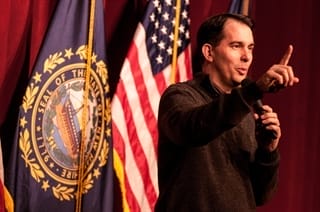The proliferation of grants-in-aid has driven up federal and state spending and taxes, hampered the prosperity and independence of Wisconsin’s citizens and ultimately moved America dangerously closer to centrally controlled governance.
The high point of Scott Walker’s quixotic, now-foolish-looking quest for the presidency, the one time when there was actually a hint of an argument that the son of a Midwestern preacher without a college degree could revive America in a way that no one else could, came before he was formally a candidate at all.
It came in January, when he nailed a high-profile speech in Iowa and launched a 527 committee, Our American Revival. Much of Walker’s allure came from his union-fighting credentials. But the Our American Revival website succinctly stated his best, somewhat ironic argument for seeking federal power: his quest to diminish that very same power and fight federal overreach:
Our American Revival believes that the government closest to the people is the most responsive and accountable to the people. We share the vision of our founders — that the powers of the federal government should be limited to those specified in the Constitution, and that federal overreach infringes on our American freedoms and values. We will work with citizens and leaders across the country to promote policies that restore power to the states and their people.
Long before the gaffes and guffaws, the vacillation on birthright citizenship, the seeming comparison of protesters in Madison to terrorists in the Middle East, the suggestion that building a wall to keep out Canucks was a legitimate issue to consider, this was the crux of the one campaign for the White House — but really against the White House — that Scott Walker could plausibly launch.
Walker was never going to be the anti-politician whom many Republicans yearn for. He was never going to be Ben Carson or Carly Fiorina or, God help him, Donald Trump. He is a politician’s politician. It’s what he knows. But he could have plausibly donned the mantle of Washington outsider in a way even the other governors in the race could not by describing how government really is most responsive and accountable when it is local. He isn’t just a governor; he was a state legislator for years and a county executive who saw how federal grants and programs and mandates, with little oversight, grow and grow and grow.
Federal grants to state and local governments grew from just $7 billion in 1960 prior to Lyndon Johnson’s Great Society to an estimated $628 billion today — about one-sixth of the federal budget. Wisconsin alone now receives nearly one-third of all state budget revenues from Washington, D.C., and as a result has forfeited control over vast areas of policy and spending.
Between 1960 and 1970 alone, types of grants-in-aid quadrupled from 132 to 530 and — despite temporary reversal of the trend during the Ronald Reagan years — have more than doubled again to over 1,100 since then.
The proliferation has driven up federal and state spending and taxes, hampered the prosperity and independence of Wisconsin’s citizens and ultimately moved America dangerously closer to centrally controlled governance.
I don’t know why Walker seemed to jettison the issue. Perhaps it simply got drowned out by a media that was disinterested. Perhaps the cloud of Trump’s hairspray obscured his vision. Perhaps it was a political calculation, a recognition that even conservatives often like lots of big federal programs and control.
I walked through the Gerald R. Ford Presidential Museum in Grand Rapids, Mich., on Wednesday, a boosterish, hometown shrine in which you have to search hard for a reason to question the judgment of the 38th president of the United States (well, aside from that pardon thing).
But I succeeded.
Reagan, the former California governor, long believed in federalism, in returning power to the states and local communities. He campaigned on it in 1976, when he unsuccessfully challenged Ford for the Republican nomination. It backfired in New Hampshire when Ford, a creature of Washington, claimed it was an effort to move federal programs onto state budgets and used the issue in the famously tax-wary state to help win the primary and eventually the nomination.
Some conservatives in New Hampshire still want to talk about the issue. In fact, some of the presidential candidates are taking part in a forum on practical federalism in New Hampshire this weekend. But the reality is that for all the dislike of federal overreach and Washington insiders, even conservative voters often like “free” federal money.
Perhaps Walker realized that the federalism issue can be a tough one to sell without telling lots of specific stories about how detrimental federal overreach can really be. Perhaps — now that he’s back in Wisconsin and maybe looking for something to do — he can use his state bully pulpit to expound on the issue the way he seemed to want to way back in January.
Mike Nichols is president of the Wisconsin Policy Research Institute.





